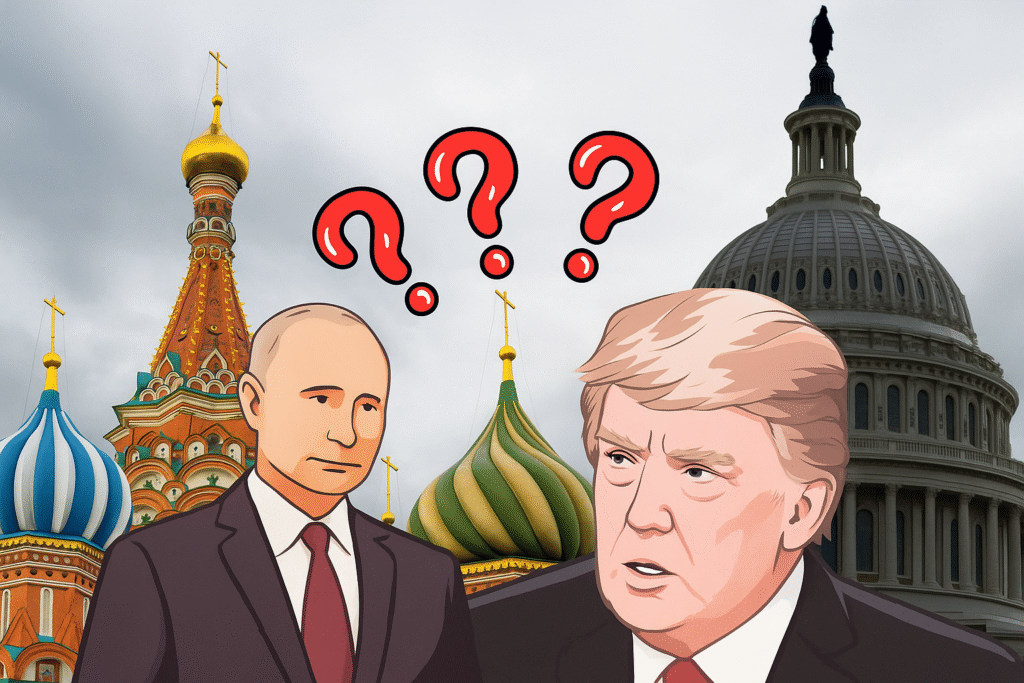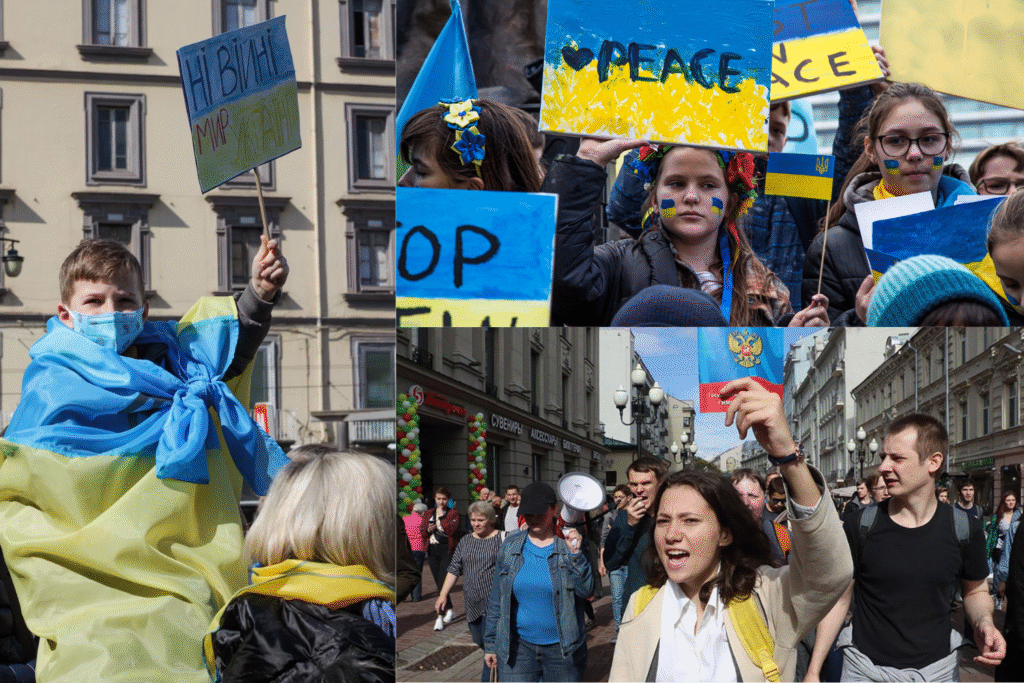
Table of Contents
Background
Three People Walk Into Anchorage, Alaska…
It sounds like the start of a joke: three people walk into Alaska. But this isn’t an empty joke. it’s real politics. In August 2025, President Donald Trump, newly re-elected and back in the White House, sat down in Anchorage with Russian President Vladimir Putin.
And the third person? You.
Because whether you realise it or not, what happens in meetings like this affects your future – your rights, your freedoms, your security, and even the price of your food. So let’s break down what this all means, through the lens of law.
What Does This Mean Legally?
President Trump
When President Trump met with President Putin two days ago, he was exercising his powers under U.S. law, specifically those related to foreign policy. The ability to impose sanctions – economic penalties on other countries – is a powerful legal tool granted by Congress. Sanctions can freeze assets, restrict trade, and block travel, all aimed at influencing a foreign government’s behaviour. In the context of the meeting, the threat of new sanctions was a legal and diplomatic leverage point, showing how domestic law can be used as a weapon in international relations. However, President Trump’s decision to seemingly back-off stronger sanctions against his ‘neighbour’ for now is also significant. It shows that his strategy in procuring peace is opaque by the standards of what other leaders – Macron, Merz, Starmer – have shown so far, which may create anxiety across the world. However, one more hopeful element of Trump’s policy towards sanctions is that, as per this Baker McKenzie blog post, his administration has not removed any sanctions and has shown some leniency towards his predecessor’s energy sector sanctions. These actions may give more hope to those who strive for peace across the world as they do, in a sense, suggest that President Trump may be playing the long game.
However, Trump’s apparent desire to strike an ‘appeasement-esque’ deal involving Ukraine ceding land is also incredibly troubling for both international law and US law (as international law is a part of US law). His acceptance of Russia’s crimes in this way would make the United States complicit in crimes against peace (aggression), crimes of war (humanitarian international law) and crimes against humanity (genocide). Neville Chamberlain’s apparent securing of ‘peace in our time’ obviously did not stop Hitler from seizing the rest of Czechoslovakia, striking the Nazi-Soviet Pact and ultimately, invading Poland. So why would Donald Trump take this exact page from Chamberlain’s book?

President Putin
President Putin’s presence at the meeting took place under a significant legal shadow. The International Criminal Court (ICC), which is an independent international judicial body based in The Hague, has issued an arrest warrant for him. The warrant is based on the legal concept of war crimes, which are serious violations of the laws and customs of war as defined by international treaties like the Geneva Conventions. The accusations against Putin and Maria Alekseyevna Lvova-Belova (residential Commissioner for Children’s Rights) relate to the unlawful deportation of children from Ukraine. While Russia and the United States, who welcomed another wanted war criminal Benjamin Netanyahu into the country, do not recognise the ICC’s authority, the warrant is a major legal declaration that he is a wanted person in countries that are part of the court. Perhaps, the framework of trying war crimes and bringing such heinous individuals to justice, requires a certain level of reform to boost its influence.

President Zelenskyy
A core principle of international law is sovereignty – the right of a nation to govern itself without interference from other states. For President Zelenskyy, this is the legal basis for resisting Russian aggression. His demand for the return of all Ukrainian land is a legal claim to his country’s internationally recognised borders. The meeting’s outcomes, or lack thereof, directly affect whether these legal rights will be upheld. After the meeting, it was widely reported that President Trump, in his call with the Ukrainian President, stressed that he (Zelenskyy) has ‘gotta make a deal’, highlighting the potential need to cede land – something which would undoubtedly spark outrage in Ukraine and across the world. Most importantly however, ceding land would be illegal under Ukraine’s constitution as it would be an alteration of its enshrined 1991 borders.
Ukraine has also been under marshal law since 2022. Martial law gives the government extra powers to keep the country safe and support the military during the war. Under it, some freedoms, like traveling freely, holding large events, or certain political activities are limited to focus on security. If the war were to end, Ukraine could gradually lift these restrictions, hold normal elections, and restore civil rights for everyone.

Europe & NATO
NATO and the European Union are also deeply involved in any outcomes of this conference as their member nations will undoubtedly weigh in on any future deal.
NATO’s Article 5 is a legally binding commitment. It’s a clause in the North Atlantic Treaty that states if one member is attacked, all members will consider it an attack on themselves and take action to assist the member. It’s the ultimate example of a mutual defence treaty, and its legal weight is why it’s such a powerful deterrent. In fact, it can be argued that the threat of bordering a NATO partner country of such importance to the Alliance that sparked Russia’s invasion, as it could have feared a future NATO membership for Ukraine.
From a legal standpoint, the EU was significantly affected by the Anchorage summit despite its absence. The EU has a legally binding sanctions regime in place against Russia, which could be undermined if the US, a key partner, were to strike a separate deal. This would weaken the legal and political force of the EU’s own measures. Furthermore, the meeting’s exclusion of the EU and Ukraine was seen as a legal and diplomatic snub, violating the principle that “nothing about us without us” should be decided.

And Most Importantly… You

You might be thinking, “What does all this legal stuff have to do with me?” and “Why should I care about some conference in a city called Anchorage?”
Just like you have rules at home and school that keep things fair and safe, international law is the set of rules that countries agree to follow. When a country violates these rules, it affects everyone. It can lead to more conflict, higher prices for things we buy every day, and overall, a less stable world.
The Anchorage meeting wasn’t just a political handshake; it was a conversation framed by legal principles: the right to use sanctions, the accusation of war crimes, the defense of a country’s sovereignty, and the legal promises of alliances. Understanding these legal concepts helps you see how the decisions made by leaders far away can influence the world you live in. Knowing your legal rights is important, but knowing the legal framework that governs the world is what makes you a true global citizen.
Want to learn more about the rule of law? – a concept that is greatly affected by such conferences and conflicts. Read our article on the Rule of Law now.
A Moment For the Victims:
The Russia–Ukraine war has produced devastating casualties on all sides. Independent monitoring projects estimate that as of mid-2025, over 122,000 Russian soldiers have been confirmed killed by name, with overall Russian military losses possibly exceeding 250,000 dead and 750,000 wounded. Ukrainian records confirm about 70,000 named military deaths, with tens of thousands more missing or captured. Civilian losses are also severe: the UN documents nearly 14,000 deaths in Ukraine, though estimates suggest as many as 20,000–40,000.
To honour and record these losses, multiple databases exist:
- Ukraine’s Memory Book of Fallen Defenders
- Ukraine Victims Memorial document names of soldiers and civilians
- Russian outlets Mediazona and BBC Russian maintain a growing, searchable database of named Russian military casualties;
- Leaked hospital database identifying over 165,000 wounded Russians.
How can you help?:
- Support Ukraine through United24
- Donate to Nova Ukraine
- Help Russians avoid being sent to the frontlines against their will
- Contribute to the effort to support Russians who took a stand against their oppressive regime
And many, many more ways to help. Let’s end this together.

